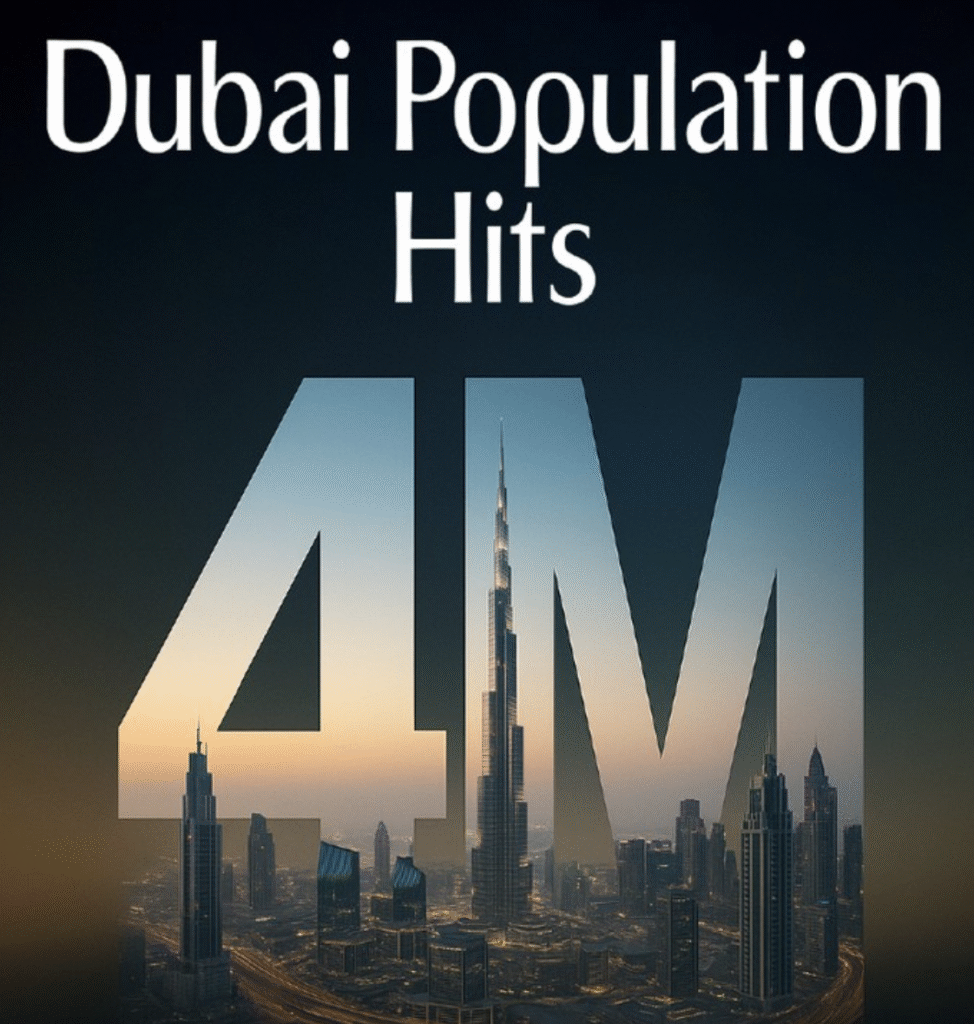Dubai has officially crossed the 4 million population mark in 2025, a historic milestone that reflects its rapid urbanization, international appeal, and economic strength. This growth carries profound implications for the city’s infrastructure, housing, economy, and long-term sustainability. As one of the fastest-growing global hubs, Dubai must now navigate the opportunities and challenges that accompany its expanding population.
Economic Implications of Dubai’s Population Surge

Increased Workforce and Economic Expansion
The surge to over 4 million residents strengthens Dubai’s human capital. With a significant portion of the population comprising expatriates, the city continues to benefit from diverse skills and global expertise. This dynamic workforce supports industries such as finance, tourism, technology, logistics, and real estate, boosting Dubai’s status as an international business hub.
Higher Consumer Demand Across Sectors
A larger population translates into increased consumer spending. Retail, hospitality, healthcare, and education sectors are experiencing stronger demand. Shopping malls, restaurants, and service providers are adapting by expanding offerings, while healthcare and education providers are scaling capacity to serve a more diverse and demanding population.
Urban Development and Infrastructure Expansion
Transportation Network Upgrades
As Dubai’s population expands, so does the pressure on its transport infrastructure. The Dubai Metro continues to expand with new lines, while smart transportation initiatives aim to reduce congestion. Road expansions, automated transport systems, and investments in sustainable mobility solutions are essential to keeping the city connected and efficient.
Housing and Real Estate Trends
The demand for residential properties has surged, reshaping Dubai’s real estate sector. Developers are focusing on affordable housing for middle-income residents alongside luxury developments for global investors. This trend is likely to intensify, with suburban communities and mixed-use developments becoming central to meeting population needs.
Smart City and Digital Transformation
Dubai’s Smart City initiatives are critical in handling rapid population growth. From AI-powered traffic management to digital government services, technology is enhancing the quality of life for residents. The shift toward smart homes, IoT integration, and digital payments makes Dubai one of the world’s most advanced urban centers.
Social and Cultural Impact of 4 Million Residents
A Diverse and Multicultural Society
Dubai’s demographic growth continues to reinforce its reputation as a global melting pot. With residents from more than 200 nationalities, the city thrives on cultural diversity. This cosmopolitan environment not only enriches the social fabric but also attracts professionals, entrepreneurs, and tourists from around the globe.
Shifts in Lifestyle and Community Development
As more families settle in Dubai, there is increasing demand for community-focused living. Parks, schools, healthcare facilities, and leisure hubs are being developed to support family life. Lifestyle trends emphasize sustainability, wellness, and high-quality amenities, shaping a modern urban culture that balances tradition and innovation.
Sustainability Challenges and Environmental Pressures
Energy and Water Consumption
A growing population intensifies Dubai’s energy and water demand. The government is investing in renewable energy projects, including the Mohammed bin Rashid Al Maktoum Solar Park, to reduce dependence on fossil fuels. Desalination and water recycling are also vital to ensuring long-term sustainability.
Waste Management and Environmental Policies
Dubai’s leadership has implemented initiatives to manage rising waste levels and promote recycling programs. The city’s “Zero Waste by 2030” strategy reflects a proactive approach to environmental management. The balance between population growth and sustainability will define Dubai’s future livability.
Green Building and Eco-Friendly Urban Planning
New regulations encourage green construction practices, eco-friendly building materials, and energy-efficient designs. Sustainable communities such as Dubai Sustainable City showcase how urban growth can coexist with environmental responsibility.
Tourism and Global Appeal in a Larger City
Tourism as a Driver of Growth
Despite being a resident milestone, population growth also enhances Dubai’s appeal to global tourists. A thriving local population supports a vibrant tourism ecosystem, from shopping and dining to cultural festivals and sporting events. Mega-projects like Expo City Dubai continue to attract international visitors, creating a synergy between residents and tourists.
Cultural Diplomacy and Global Branding
Dubai’s demographic diversity enhances its global brand as a forward-looking, tolerant, and business-friendly city. With 4 million people, the city’s soft power continues to expand, positioning it as a bridge between East and West.
Future Outlook: Dubai Beyond 2025
Projected Population Growth
Experts predict that Dubai’s population could exceed 5.5 million by 2030, driven by economic opportunities and global migration trends. This projection underscores the need for long-term urban planning and investment in sustainable infrastructure.
Balancing Growth with Sustainability
The challenge lies in maintaining Dubai’s rapid growth while ensuring that resources, housing, and infrastructure remain sustainable. The government’s Dubai 2040 Urban Master Plan provides a roadmap, emphasizing balanced development, green spaces, and livable communities.
The Vision of a Global Mega-City
Crossing the 4 million population mark positions Dubai firmly on the path toward becoming a global mega-city. Its continued success will depend on strategic planning, sustainable innovation, and maintaining its unique cultural and economic appeal.
Conclusion
Dubai’s population milestone of 4 million in 2025 is more than just a number—it represents the city’s transformation into a dynamic global hub. From economic expansion and real estate growth to sustainability challenges and cultural diversity, the implications are profound. As Dubai looks toward 2030 and beyond, its ability to balance growth, innovation, and sustainability will determine its place among the world’s leading cities.
